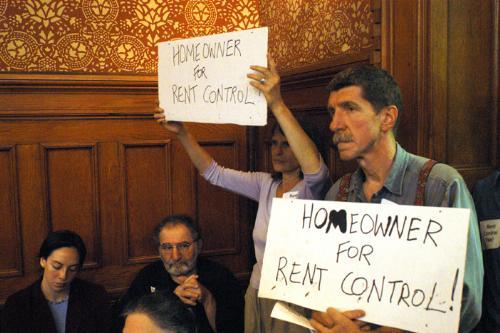
Cambridge residents show their support for rent control at a Cambridge City Council public forum yesterday. Advocates of rent control are pushing for it to be on the ballot in the November citywide elections.
Dozens of Cambridge residents clamored for a new rent control measure at a packed City Council meeting yesterday, despite persistent arguments by the measure’s opponents that it would never pass.
Rent control—which establishes limits on the rates landlords can charge tenants—was one of the most divisive issues in Cambridge politics until the practice was abolished by the state in 1994.
But now, a citizen’s group in Cambridge is fighting for its return, arguing that it would increase diversity and affordable housing.
About 7,000 people signed the group’s petition, according to campaign director Karen Hoerst. Of those signatures, almost 5,000 were certified by the city’s Election Commission.
The Massachusetts Homeowners Coalition, which hopes to keep the rent control issue off the November ballot, said 1,500 of the group’s signatures aren’t valid, according to Hoerst. The election commission will decide at a hearing tomorrow whether to accept the signatures.
Before it takes effect, the rent control measure must get on the ballot, win the support of one-third of all Cambridge voters, and then pass the State House—a series of obstacles that observers said are likely insurmountable.
The city council can also vote before Sept. 30 to send the petition directly to the State House without putting it on the ballot.
Several members of the council said yesterday that they did not support the petition, saying it was better to focus on other affordable housing programs than to debate a petition that is unlikely to pass at the state level.
“We will revisit old divisions for an initiative that has little or no chance,” Councillor Anthony D. Galluccio said. “I feel that this is an irresponsible initiative. I feel that it has little likelihood for success.”
Several other councillors agreed with his reasons for not supporting the petition.
“I do not think it’s one that we should be spending our time on,” Mayor Michael A. Sullivan said.
Calling herself a “firm supporter of rent control,” Councillor E. Denise Simmons was the only member of the council who spoke in favor of the petition going on the ballot.
“This petition is the voice of the citizens,” Simmons said. “Whether we like rent control or not, everyone has the right to have their voice heard.”
The councillors’ remarks were met by loud responses from the packed public seating area, where supporters of rent control grouped together on one side and opponents on the other.
At one point, Councillor Kenneth E. Reeves ’72 said, “The legislature is not going to sign this,” and one woman shouted, “We have a right to try!”
During public comment period, which ran over an hour, 16 spoke in favor of rent control and 9 against.
Residents who organized the petition said the city is facing a housing crisis and that high rents are driving families out of the city.
“Since rent control went out, the neighborhood has declined,” said resident William Hendricks.
And the petition’s proponents stressed that they were not advocating the same type of rent control that existed before 1994. The new proposal, for example, allows owners who devote some units to low or moderate income housing to receive exemptions on other units.
“This is different from the rigid rent control we had before,” said resident Nancy Hall. She added that some property owners were seeking “profit at the expense of people’s homes and communities.”
But opponents of rent control said its abolition had brought benefits to the city, as landlords put more money into fixing up their property. Some challenged the idea that the housing market has suffered since rent control’s demise.
“Even in Cambridge, supply and demand works,” said Linda Levine, a board member and former president of the Small Property Owners’ Association.
Another resident, Laura Rood, called the rent control petition an “oppressive, divisive piece of legislation.”
She told the city councillors it is their responsibility to ensure that there is enough affordable housing for city residents, and that the burden should not rest on property owners.
“Where have you put all our tax money? Where is the affordable housing?” she asked.
Members of the council defended their record on housing, an area in which Sullivan said the community had invested $200 million.
“The government has a responsibility to ensure that the housing market is there for you,” Sullivan said.
Councillor Marjorie C. Decker emphasized that a rent control petition was unlikely to be passed by the state and that more direct action would be needed to solve what she called an “undeniable crisis.”
“We’re going to draw the lines and the people who are really going to get hurt are the ones who need affordable housing,” Decker said.
Stephen H. Milder ’04, who is working for the campaign of city council candidate and rent control supporter Aimee Smith, said the issue of housing is one that should concern students, as well.
“Harvard and MIT are two of the reasons why people can’t afford to live here,” Milder said. “I think it’s important that students speak up to make sure the University takes some responsibility.”
—Staff writer Jessica R. Rubin-Wills can be reached at rubinwil@fas.harvard.edu.
Read more in News
Top Israeli Official Talks Policy












